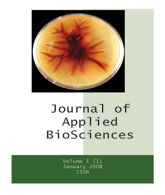Journal of Applied Biosciences (J. Appl. Biosci.) [ISSN 1997 - 5902]
Volume 9(2): 389 - 395. Published September 2008.
A review of the Amplified Fragment Length Polymorphism (AFLP) technique for genotyping and DNA fingerprinting studiest
W.M. Muiru^*, B. Koopmann**, A.V. Tiedemann**, E.W. Mutitu* and J.W. Kimenju*
*Department of Plant Science and Crop Protection, University of Nairobi, P.O. Box 29053, Nairobi, Kenya; **Department of Crop Sciences, Division of Plant Pathology and Plant Protection, University of Göttingen, Grisebachstr. 6, D-37077 Göttingen, Germany.
*^ Corresponding author e-mail: wmmuiru27@yahoo.com
ABSTRACT
Amplified fragment length polymorphism (AFLP) is a marker based on polymerase chain reaction amplification of restricted fragments ligated to synthetic adaptors and amplified using primers which carry selective nucleotides at their 3’ ends. The technique generates highly reproducible markers from DNA of any organism and allows high resolution genotyping. AFLP has broad applications and has been used to investigate genomes of different complexity from microbes to higher organisms for purposes of species, strains and varieties identification, systematics, pathotyping, population genetics, simple and complex trait mapping, population genetics, construction of linkage and physical maps. In addition, it is being used in medical diagnostics, forensic analysis and microbial typing. AFLP is superior compared to other markers in that it has time efficiency, generates more information, is highly reproducible and has a wide range of applications. The marker has a drawback in that it generates dominant rather than co-dominant markers and can also be expensive if automated systems are used.
Key words: DNA fingerprints, marker, polymorphism, restriction, sequence
FULL PAPER [PDF AVAILABLE HERE]
